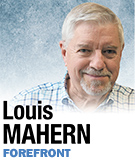Subscriber Benefit
As a subscriber you can listen to articles at work, in the car, or while you work out. Subscribe Now
 Since the death penalty was reinstituted in 1977, nearly 1,300 individuals have been executed in the United States. More than 3,200, including 14 in Indiana, remain on death row. We still have time to get it right for these upcoming executions.
Since the death penalty was reinstituted in 1977, nearly 1,300 individuals have been executed in the United States. More than 3,200, including 14 in Indiana, remain on death row. We still have time to get it right for these upcoming executions.
While advocates of capital punishment usually argue its deterrent effect, there are other equally important and perhaps even more valid reasons for its application.
However, the current administration of the death penalty operates at cross-purposes with its desired social ends. I offer a proposal to resolve these contradictions and bring to capital punishment a consistency with its purposes.
The most popular theory in support of state-sanctioned killing holds that potential criminals, once aware of the death penalty, will reform or at least abstain from their more serious felonies.
Capital punishment, so the theory goes, is a form of communication between societies and would-be criminals—a message that describes the cause-and-effect relationship between serious crime and severe punishment.
Why, then, conduct executions at times and places that preclude public attendance?
Educators tell us that information most likely retained is that which is experienced by the most senses. While the idea of a T-bone steak can be communicated verbally, we are much more likely to comprehend the essence of a T-bone steak if we can see it sizzling on the grill, smell the meaty charcoal aroma, listen to its crackling and popping as it is placed before us, and finally taste it in its full succulence.
Does it not stand to reason then, that potential criminals would more likely comprehend the social message in an execution if they could watch the condemned dragged weak-kneed to the gurney, see the unbelieving terror in his eyes, listen to his fruitless protestations, smell the faint chemical odor, and feel the dryness in their own mouths as they witness this object lesson in justice?
But how can future felons learn this lesson? How can they accurately receive this social signal when the message is muffled behind tall walls in the dark of night?
In addition to the argument of deterrence, capital punishment has as a principle use the satiation of public revenge. Particularly vile crimes repulse the community and engender barroom and laundromat mutterings as to the fate that should befall the perpetrator.
This need for vengeance cannot be met by an execution conducted out of public view. There is little satisfaction to be gained from sterile print in the morning paper or from a TV anchor regarding last night’s execution.
How much more satisfying and beneficial to hold the ceremony in a public forum. With the sentencing judge and jury in attendance (this is, after all, a matter of justice) the nearest willing relative of the victim would be invited to flip the switch to start the drip.
This open-air event would permit the entire community to feel the sweetness of revenge in its full flower and would constitute a reaffirmation of our oldest biblical value, an eye for an eye.
Now I know this sort of thing could get out of hand. However, all matters of taste in souvenirs would be referred to a committee of artists and designers, not unlike the approach used by William and Kate at their royal wedding earlier this year.
Yes, there will be additional expense, but none I believe that could not be covered by the sale of TV, Internet and DVD rights.
Aside from the execution itself, the high point of the event will be when the condemned is invited to address the gathered. The tremor in his voice, the tear on his cheek shown on the Jumbotron will particularly impress the children present
What parent will not go home that night a little more assured as to his offspring’s future behavior?
What future criminal will not pause to recalculate the price he is willing to pay?
What victim’s mother will not sleep a little more soundly?•
__________
Mahern has been an assistant to U.S. Rep. Andy Jacobs and U.S. Sen. Birch Bayh and served in the Indiana Senate. Send comments on this column to [email protected].
Please enable JavaScript to view this content.
